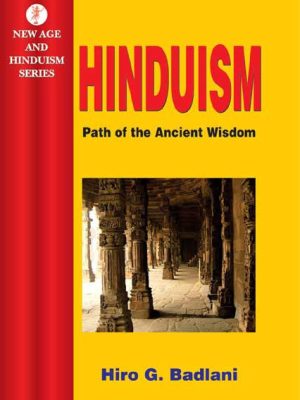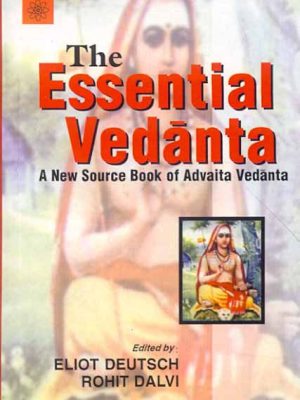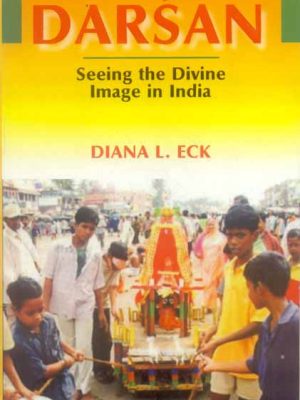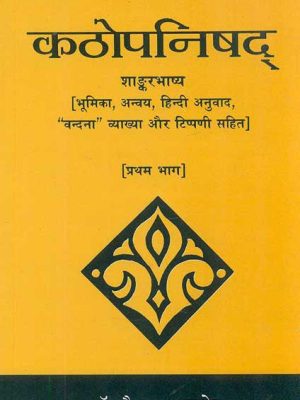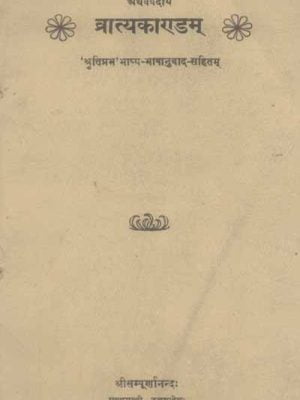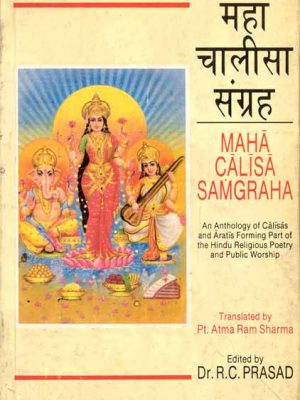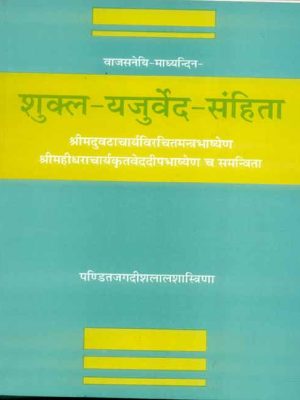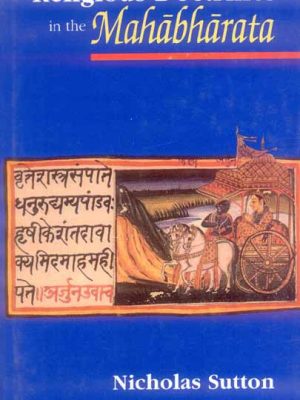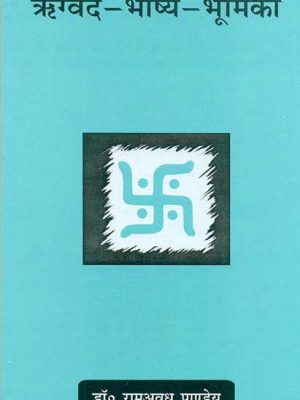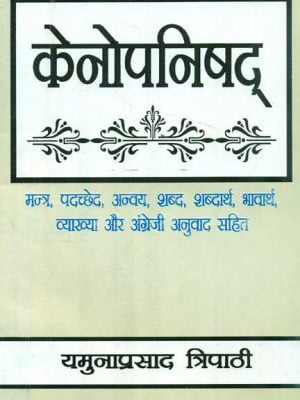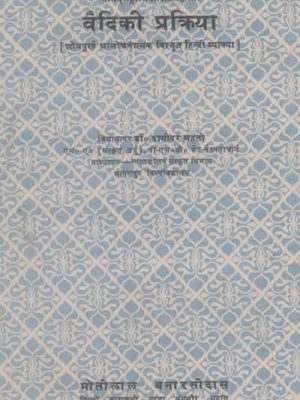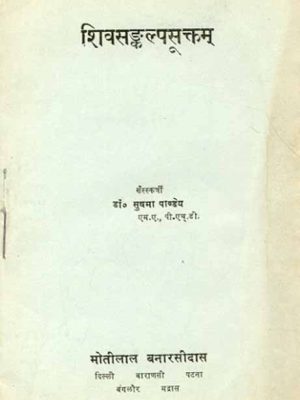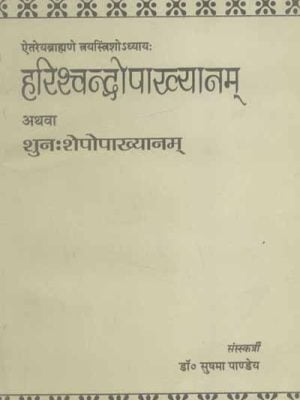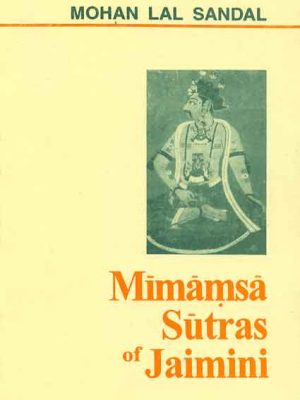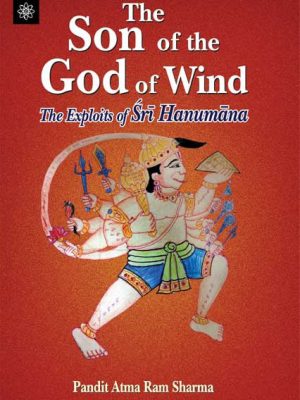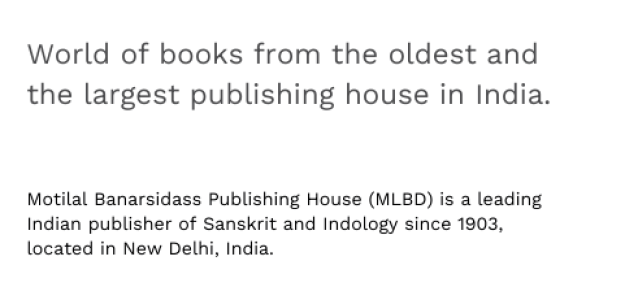
Motilal Banarsidass Publishing House
-
Hinduism: Path of the Ancient Wisdom
Hinduism: Path of the Ancient Wisdom
Hinduism is the oldest surviving religion in the world. It has evolved from prehistoric times through various phases of ongoing development and includes religious and spiritual literature which is vast and diverse. This book provides a well groomed summary of all aspects of Hinduism in a simple and straightforward language. It includes 63 chapters spread over 367 pages. Chapters 1 through 18 discuss the origin of Hinduism and its scriptures, Hindu spirituality, Hindu code of conduct, soul consciousness, the divine path of virtue, and Hindu Trinity. Chapters 19 through 42 include topics such as teachings of Ramayana, Mahabharata, Bhagavad Gita, ancient philosophy of Yoga, Buddhism, Jainism, Sikhism, teachings of Bhagavatam and spiritual teachings of some of the popular Hindu saints such as Vivekananda, Paramahansa Yogananda, Swami Chinmayananda and many other spiritual masters. Chapters 43 through 56 provide discussions on Hinduism and science, meditation, satsanga (holy company), Ayurveda, vegetarianism, Hindu wedding, Hindu symbols and icons, Hindu customs, festivals, interfaith issues and Hinduism and fine arts. The remaining chapters 57 through 63 include discussions on evolution of Hindu temples, a pilgrimage through India, Hindu temples in USA and rest of the world, and Hindu prayers.
Message from Baba Hari Dass, Mount Madonna, Santa Cruz, California. ‘Hinduism: Path of the Ancient Wisdom’ gives the ancient history of Hinduism. The book is like a map of Hinduism, which shows from where one should start his or her spiritual journey, and where the journey ends. This is also a guidebook to those who don’t know what Hinduism is, especially for those Hindus who are settled in foreign countries and have no knowledge of their own religion.
Writing this book has been like playing the second inning of my life. The first inning was my medical career of over forty years in Mumbai, India. After retiring, my wife and I set up base in the United States. It was then that a friend gave me a book titled The Essentials of Hinduism by the learned Swami Bhaskarananda of Seattle, Washington. The book fascinated me so much that I read it many times and later developed a close relationship with the author. I resumed a childhood habit of reading extensively, but this time, my reading was not for just any book; rather, it was exclusively for works on Hinduism. There was an urge to explore and search the deeper meaning embedded in the Hindu faith.
₹450.00 -
The Essential Vedanta: A New Source book of Advaita Vedanta
The Essential Vedanta: A New Source book of Advaita Vedanta
The Essential Vedanta is a comprehensive introduction to the tradition of Advaita Vedanta based upon primary sources and makes possible a study of it in its classical form. Translations from all major sanskrit writings are included as well as selections from all of the most important representatives of this central philosophy of India.
About the Author(s)
Rohit Dalvi
₹450.00 -
Darsan
Darsan
The experience of the divine in India merges the three components of sight, performance, and sound. This book is about the power and importance of “seeing” in the Hindu religious tradition. In the Hindu view, not only must the gods keep their eyes open, but so must we, in order to make contact with them, to reap their blessings, and to know their secrets. When Hindus go to temple, their eyes meet the powerful, eternal gaze of the eyes of God. It is called Darsan, “Seeing” the divine image, and it is the single most common and significant element of Hindu worship. This book explores what darsan means. This is also a book about the divine image in the Hindu tradition. What do Hindus see in the images of the gods? What is meant by these multi-armed gods, with their various weapons, emblems, and animals? How are these images made and consecreted? How are they treated in a ritual context? In exploring the nature of the divine image, this book not only considers the images of the gods, but also the Hindu temple and the Hindu place of pilgrimage.
Author
DIANA L. ECK
₹295.00Darsan
₹295.00 -
Kathopanishad (Pratham Bhag): Shankar Bhashya [Bhumika, Anvaya, Hindi Anuvad, “Vandna” Vyakhya aur Tippani Sahit
Kathopanishad (Pratham Bhag): Shankar Bhashya [Bhumika, Anvaya, Hindi Anuvad, “Vandna” Vyakhya aur Tippani Sahit
Author
Baijnath Pandey
₹100.00 -
Vratyakanda-Atharvaveda: Sanskrit-Hindi Vyakhya
Vratyakanda-Atharvaveda: Sanskrit-Hindi Vyakhya
Vratyakanda-Atharvaveda: Sanskrit-Hindi Vyakhya
Author
VISHWANATH VIDYALANKAR
₹495.00 -
Maha Calisa Samgraha: An Anthology of Calisas and Aratis forming part of the Hindu
Maha Calisa Samgraha: An Anthology of Calisas and Aratis forming part of the Hindu
A Calisa is a 40-verse song dedicated to the many manifestations of Visnu and other powerful deities, such as the goddesses. It’s obvious that these are songs of devotion. introduction and notes to a significant source of reference on Hinduism. Maha Calisa Samgraha: An Anthology of Calisas and Aratis forming part of the Hindu
Author
₹295.00 -
Shukla-Yajurved-Samhita
Shukla-Yajurved-Samhita
The Yajurveda Samhita or the prayer book of the Adhvaryu priest is recorded to have had as many as 101 recensions at the time of the grammarian Patanjali, out of which, only 5 have survived and are available at present, viz., Kathaka,Kapisthala, Maitrayani, Taittiriya, and Vajasaneyi, the first four belonging to the ‘Black Yajurveda’ and the fifth to what is designated as ‘White yajurveda.’ The Vajasaneyi Samhita which takes its name from Yajnavalkya Vajasaneya, the chief teacher of this Veda, has come down in two slightly differing versions known as the Kanva and the Madhyandina Samhitas. The chief difference between the texts of the ‘Black’ and ‘White’ Yajurveda lies in the fact that the latter contains only the Mantras, i.e., the prayers and sacrificial formulae which the priest has to utter, while the former contains in addition a presentation of the sacrificial rites belonging to them as well as the Brahmana or theological discussion on the same.
About the Author(s)
VENI RAM SHARMA GAUD
₹1,295.00Shukla-Yajurved-Samhita
₹1,295.00 -
Religious Doctrines in the Mahabharata
Religious Doctrines in the Mahabharata
In this new edition of a classic text on the Mahabharata, the primary concepts and themes are discussed and evaluated. unique take on one of India’s best-known epics. A lot of positive feedback.
Author
Nicholas Sutton
₹795.00 -
Rigveda-Bhashya-Bhumika: Hindi Anuvad Sahit
Rigveda-Bhashya-Bhumika: Hindi Anuvad Sahit
Rigveda-Bhashya-Bhumika: Hindi Anuvad Sahit
Author
Ramavadh Pandey
₹225.00 -
Kenopanishad: Mantra, Padachched, Anvaya, Shabd, Shabdarth, Bhavarth, Vyakhya aur Angreji anuvad sahit
Kenopanishad: Mantra, Padachched, Anvaya, Shabd, Shabdarth, Bhavarth, Vyakhya aur Angreji anuvad sahit
Author
Yamuna Prasad Tripathi
₹100.00 -
Vediki Prakriya: Shodhpurna Alochanatamak Vistrit Hindi Vyakhya
Vediki Prakriya: Shodhpurna Alochanatamak Vistrit Hindi Vyakhya
Vediki Prakriya: Shodhpurna Alochanatamak Vistrit Hindi Vyakhya
Author
Damodar Mehto
₹375.00 -
-
Harishchandropakhyanam: Athva Shunah Sheshopakhyanam
Harishchandropakhyanam: Athva Shunah Sheshopakhyanam
Harishchandropakhyanam: Athva Shunah Sheshopakhyanam
Author
Sushma Pandey
₹100.00 -
Mimamsa Sutras of Jaimini
Mimamsa Sutras of Jaimini
One of the most important ancient Hindi philosophical writings is Jaimin’s Purva Mimamsa Sutras. Indian philosophy is based on Mimamsa, the first of the six orthodox (Dars’anas) schools. The complete work is divided into twelve adhydyces (chapters) which are further divided into sixtypadas (sections). Besides presenting conceptual explanations for the performance of Vedic rituals, the literature explains the meaning and significance of these practises in order to help readers achieve liberation, or Moksha.
According to Jaimini’s Mimamsa Sutra, all of reality is made up of material activity and the effects it produces. In the Karma-mimamsa school of thought, he and later adherents believe that there is no end to the cycle of rebirth, and that there is no freedom. Higher rebirth in the Deva realm is all that can be hoped for by Mimathsas in the endless circle of karma. It is because of this, they say, that the Vedas exist in the first place, that the primary task of a mature soul is to understand and carry out the sacrifice directives contained in the Vedas.
Author
PANDIT GANGANATHA JHA
₹495.00Mimamsa Sutras of Jaimini
₹495.00 -
The Son of the God of Wind: The Exploits of Sri Hanumana
The Son of the God of Wind: The Exploits of Sri Hanumana
The majority of the population in India is devoutly religious. In India, a significant portion of the populace reveres Hanumana as a deity. Sri Hanumana ji temples can be found in every hamlet, town, and city in India. A lot of people are inspired, energised, and awakened by the spirit of Sri Hanumana Ji. It encourages them to work hard, be religious, and help others. As long as Sri Hanumana ji is around, he maintains them on the right road.
Because of his devotion to Sri Rama, Hanumana ji has lost his sense of self-identity and no longer exists independently of the Lord. He embodies all of the attributes that Sri Rama possesses. Hanumana, an avatar of Visnu, represents the pinnacle of Hindu devotion to Lord Rama. That is why he is so highly regarded.
The present work is the result of translation of selected stories about Sri Hanumana by late Pandit Atma Ram Sharma. Despite the fact that the translation only includes a few stories, the stories are all connected and make for an interesting read.
Nonresident Indians, who are always looking for a method to feel more deeply connected to their religious and cultural traditions, may find this book particularly interesting.
Author
PANDIT ATMA RAM SHARMA
₹400.00
